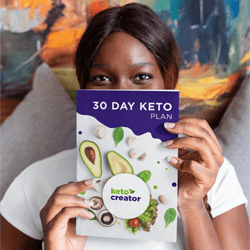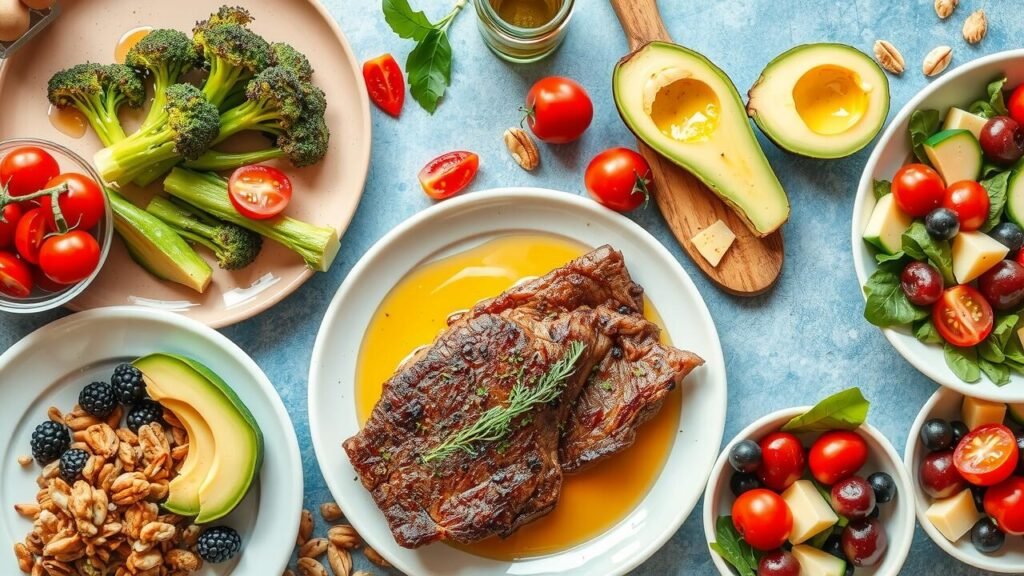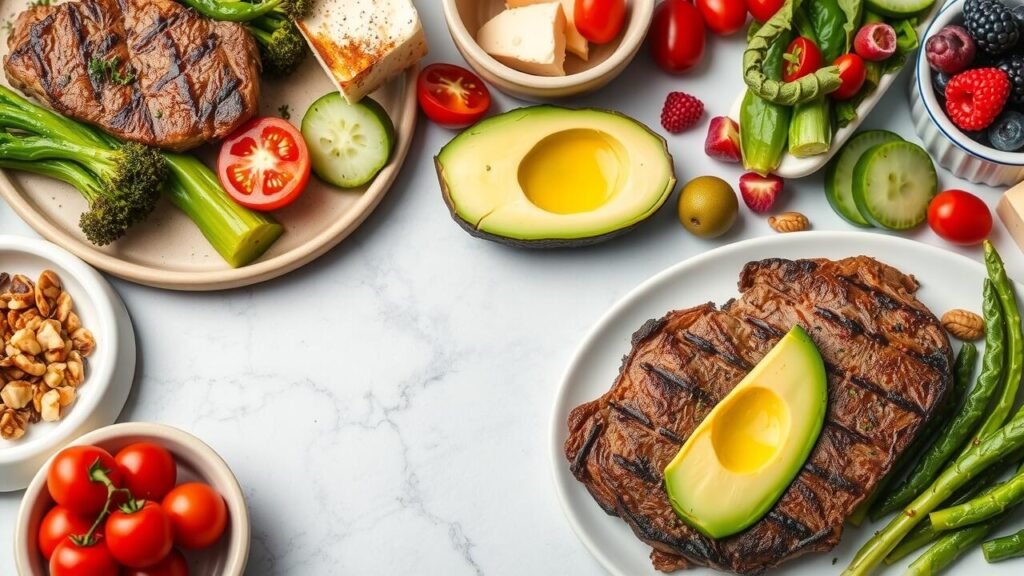Snacks That Fit the Keto Lifestyle
Know Exactly What To Eat
- Follow a 30-day plan that tells you exactly what to eat and when
- Combine the plan with optional workouts if you want extra tone
- Get guidance that’s designed to be practical with a busy schedule
Snacking can be a convenient way to maintain energy levels while following a ketogenic diet. Opt for options that are low in carbohydrates and high in healthy fats. Examples include avocado slices with a sprinkle of salt, cheese cubes, or a handful of nuts like almonds and macadamia nuts. These snacks not only satisfy hunger but also contribute beneficial nutrients that align with keto principles.
Vegetable sticks paired with low-carb dips also make excellent choices. Celery with almond butter or bell pepper slices with guacamole can curb cravings effectively. Hard-boiled eggs are another versatile snack, offering protein and healthy fats in a portable form. Finding a variety of snacks can help keep your meals exciting while staying within the limits of your carb allowance.
Delicious Low-Carb Snack Ideas
Snacking on keto doesn’t have to be boring. A variety of options can satisfy cravings and keep you on track. Nuts, especially almonds and macadamia nuts, are great for providing healthy fats while being low in carbohydrates. Cheese also makes for a delicious choice and can be enjoyed in different forms, such as string cheese or cheese crisps. For a savory option, consider cucumber slices topped with cream cheese or guacamole, which offer a refreshing crunch along with rich flavors.
For those who have a sweet tooth, there are plenty of low-carb snacks that can cater to that craving. Berries like strawberries and blackberries can be enjoyed in moderation, pairing beautifully with whipped cream for added indulgence. Dark chocolate with a high cocoa content can also be a delicious treat without derailing your macro goals. Another enticing option is making fat bombs, using ingredients like coconut oil, nut butter, or avocado, offering both taste and nourishment in convenient bite-sized servings.
Hydration and Electrolytes
Staying hydrated is crucial when embarking on a ketogenic diet. As the body transitions into ketosis, it often expels more water and electrolytes due to reduced carbohydrate intake. This process can lead to dehydration and may result in symptoms like fatigue, dizziness, or headaches. Drinking plenty of water not only replenishes lost fluids but also aids in digestion and overall well-being. Aim for at least eight glasses of water a day, and consider incorporating electrolyte-rich beverages to maintain balance.
Electrolytes play a vital role in bodily functions, especially when following a low-carb diet. Sodium, potassium, and magnesium are particularly important, as they help regulate muscle function and fluid balance. Consuming foods high in these minerals, such as avocados, leafy greens, and nuts, can help prevent deficiencies. Additionally, using electrolyte supplements or adding a pinch of salt to your meals may alleviate symptoms commonly referred to as the “keto flu.” By prioritizing hydration and electrolyte intake, you can enhance your keto experience and support your body during this dietary shift.
Importance of Staying Hydrated on Keto
Maintaining proper hydration is crucial when following a ketogenic diet. As the body transitions into ketosis, it often leads to increased water loss. This can trigger symptoms of dehydration, including fatigue, headaches, and muscle cramps. Ensuring adequate fluid intake helps to mitigate these effects and supports overall health during the initial adjustment phase.
Electrolyte balance is also impacted by a shift to a low-carb lifestyle. A decrease in insulin levels prompts the kidneys to excrete excess sodium, which can result in a loss of critical minerals like potassium and magnesium. Drinking water consistently and replenishing electrolytes through food sources or supplements can help maintain this balance, contributing to energy levels and overall well-being.
Stop Cravings Without Starving Yourself
- Try new dishes without spending hours cooking or searching recipes
- Enjoy flavorful sauces, garnishes, and variety to stay motivated
- Support long-term health habits with the longevity-focused guide
Common Mistakes to Avoid
Starting a keto diet can be overwhelming. Many newcomers overlook the importance of tracking their carbohydrate intake. Consuming hidden carbs can impede progress and lead to frustration. Additionally, not paying attention to portion sizes may result in unintended weight gain. It is essential to weigh and measure food to maintain proper macros.
Another common pitfall is neglecting hydration and electrolyte balance. The body loses a significant amount of water and electrolytes when transitioning to ketosis. This can lead to symptoms commonly referred to as the “keto flu.” Ensuring adequate water intake and replenishing electrolytes through dietary sources or supplements can help mitigate these effects, making the adjustment period smoother.
Pitfalls for Beginners in Their First Week
Many beginners underestimate the importance of preparation when starting a keto diet. One common mistake is not planning meals and snacks ahead of time, which can lead to poor food choices or a reliance on high-carb convenience foods. Creating a weekly meal plan, complete with grocery lists, can help maintain focus and ensure that you stick to your low-carb goals.
Another frequent pitfall is neglecting to monitor your carb intake closely. Some may assume that all low-carb foods are acceptable without understanding their impact on daily carbohydrate limits. Tracking macronutrients through an app or journal can help maintain awareness of carb counts and avoid inadvertently exceeding the daily allowance. Being vigilant about hidden sugars in products is essential for successful adherence to the keto lifestyle.
FAQS
What are some good snacks to eat during my first week on keto?
Some great snack options include cheese sticks, nuts (such as almonds or walnuts), celery with cream cheese, pork rinds, and hard-boiled eggs.
How important is hydration when starting a keto diet?
Staying hydrated is crucial on a keto diet because it helps maintain electrolyte balance and supports overall bodily functions, especially as your body adjusts to burning fat for fuel.
What common mistakes should I avoid in my first week of keto?
Beginners often forget to track their carb intake, neglect hydration and electrolytes, or overconsume protein. It’s important to monitor your food choices and adjust as necessary to stay within your carb limits.
Can I eat fruits during the first week of keto?
While most fruits are high in carbs, you can enjoy small portions of low-carb options like berries (strawberries, raspberries, or blackberries) in moderation.
How can I ensure I’m getting enough electrolytes on keto?
To maintain electrolyte balance, increase your intake of potassium, magnesium, and sodium through foods like avocados, leafy greens, nuts, and by adding sea salt to your meals or considering electrolyte supplements.
Related Links
Break Free From Processed Food
- Reduce cravings for sugar and processed fast food over time
- Make weeknights easier when you don’t have dinner planned
- Stay consistent without obsessing over tracking every decision


